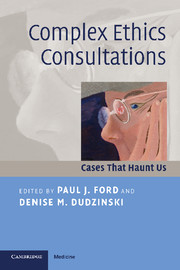Book contents
- Frontmatter
- Contents
- List of contributors
- Foreword
- Acknowledgments
- Introduction: Live and learn: courage, honesty, and vulnerability
- Part I Starting at the beginning: prenatal and neonatal issues
- Part II The most vulnerable of us: pediatrics
- Part III Diversity of desires and limits of liberty: psychiatric and psychological issues
- Part IV Withholding therapy with a twist
- Part V The unspeakable/unassailable: religious and cultural beliefs
- Part VI Human guinea pigs and miracles: clinical innovations and unorthodox treatment
- Part VII The big picture: organizational issues
- Conclusions, educational activities, and references
- Index
Conclusions, educational activities, and references
Published online by Cambridge University Press: 03 May 2010
- Frontmatter
- Contents
- List of contributors
- Foreword
- Acknowledgments
- Introduction: Live and learn: courage, honesty, and vulnerability
- Part I Starting at the beginning: prenatal and neonatal issues
- Part II The most vulnerable of us: pediatrics
- Part III Diversity of desires and limits of liberty: psychiatric and psychological issues
- Part IV Withholding therapy with a twist
- Part V The unspeakable/unassailable: religious and cultural beliefs
- Part VI Human guinea pigs and miracles: clinical innovations and unorthodox treatment
- Part VII The big picture: organizational issues
- Conclusions, educational activities, and references
- Index
Summary
Concluding comments
Micah Hester, reflecting on the case he presented in this book, eloquently articulates the notion of haunting presented throughout this volume:
Hauntings can … take the form of voices speaking to us, as warnings, as reminders; they can beg and plead. Hauntings are often presented as externally manifest, but they just as often find form as internal, persistent, nagging dialog. Hauntings are typically described as something which is feared, but it seems as plausible to see them as stimulants to reflection and concern, a reminder to be humble and a catalyst for intelligent deliberation.
(Hester, p. 7)His description encapsulates the variety of ways that authors characterized their haunting cases. In addition to the consultants being haunted, broad conceptual themes tie the cases in this book together. First, every author strives to act with integrity, which requires a combination of being true to oneself and one's profession, adhering to standards and rules, and remaining creative, flexible, and fair. At the beginning of this text, Macauley and Orr initiate the theme of integrity by telling a story of doubt, self-scrutiny, collaboration, forgiveness, and courage. Every subsequent essay implicitly or explicitly addresses personal or professional integrity. Authors describe challenges that a maturing profession should address. Sufficient time has elapsed for full consideration, debate, and incorporation of the American Society for Bioethics and the Humanities' The Core Competencies in Health Care Ethics Consultation, guidelines that have become our professional practice standards. The essays in this book demonstrate how these commitments to core standards “play out” in complex cases.
- Type
- Chapter
- Information
- Complex Ethics ConsultationsCases that Haunt Us, pp. 226 - 242Publisher: Cambridge University PressPrint publication year: 2008



